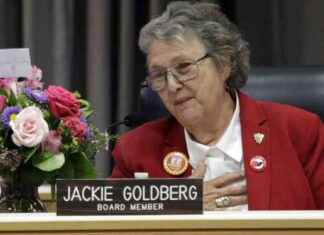The ruling party in Ghana on Saturday, November 4, nominated the country’s current vice-president, Mahamudu Bawumia, as candidate for the 2024 presidential election, whom it hopes to succeed the outgoing head of state, Nana Akufo- Addo, at the head of the country since 2017. The vote, which opened in the morning, took place while the country was going through its most serious economic crisis in decades, marked in particular by galloping inflation, which should dominate the debates of the election campaign.
Big favorite of the primary, Mahamudu Bawumia, vice-president of the country since 2017 and former vice-governor of the Central Bank, won the votes of delegates of the New Patriotic Party (NPP), who had to choose between four aspiring candidates, according to the results published Saturday evening by the Electoral Commission.
In December 2024, he will face opponent John Dramani Mahama, 64, former president from 2012 to 2017 and chosen in May to once again wear the colors of his party, the National Democratic Congress (NDC). “I represent the NPP’s best chance to win the 2024 election,” assured Mahumudu Bawumia during a press briefing on Thursday. “I am committed to preserving the unity of the party and bringing everyone together,” assured the candidate who considers himself “more popular with the people than with the elites.”
His main opponent during the primary, the current deputy for the Assin Central constituency, Kennedy Agyapong, also put forward this argument. Its spokesperson, William Kusi, told AFP on Thursday that he was “confident in Saturday’s victory”, claiming to have “the people with us”.
Inflation of 40% over one year
For Kwame Asah-Asante, professor of political science at the University of Ghana, the battle was close and played out “between Bawumia and Agyapong”. Former Minister of Agriculture Owusu Afriyie Akoto and former MP Francis Addai-Nimoh were also in the running.
Kwasi Amakye-Boateng, professor at the Kwame Nkrumah University of Science and Technology, told AFP before the result of the vote that if Mr. Bawumia was nominated as the candidate to represent the party in 2024, “he will have to be accountable for the state of the country’s economy and it won’t be easy.”
A major producer of cocoa and gold, Ghana also has gas and oil reserves, but its debt load has exploded, as in other sub-Saharan African countries, under the impact in particular of the coronavirus pandemic. Covid-19 and the Ukrainian conflict.
At the beginning of October, hundreds of opposition members demonstrated in the streets of the capital to protest against the economic crisis, inflation – which reached 40% over one year – and the management of the government.
President Nana Akufo-Addo, elected in 2017 under the colors of the NPP and whose two successive mandates authorized by the Constitution are coming to an end, was forced to turn to the IMF in 2022, in order to fend off the specter of a default mentioned by certain economists. He thus reached an agreement with the financial institution for 3 billion dollars. Since the country’s entry into a multi-party system in 1992, political alternations have been peaceful in Ghana.






